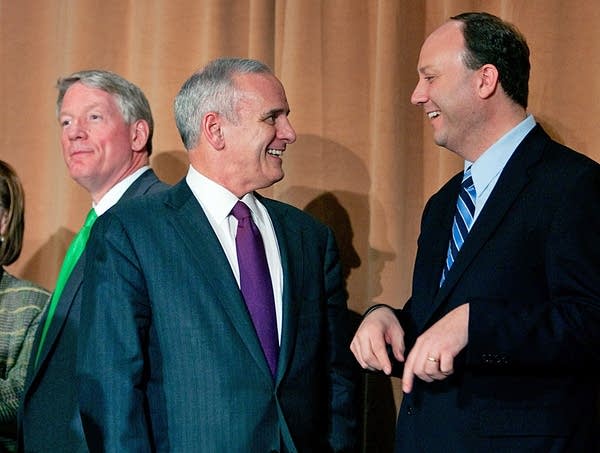Cattle-call debate draws 20 Minn. gov hopefuls
Go Deeper.
Create an account or log in to save stories.
Like this?
Thanks for liking this story! We have added it to a list of your favorite stories.

This year's super-sized governor's race was on display Wednesday night in Bloomington, as 20 candidates from three political parties shared the same stage and made a pitch to voters.
It was the biggest event yet in a campaign that started last summer. Ten Democrats, six Republicans and four Independence Party hopefuls filled two long banquet tables at the front of a hotel conference room in Bloomington, fielding questions about everything from foreclosures to the state's budget problems and divided government.
The race is wide open, with GOP Gov. Tim Pawlenty moving on after two terms.
Minnesota News Council Chairman Tony Carideo opened the debate by joking that the lineup looked like "either a Senate panel or a telethon."
Turn Up Your Support
MPR News helps you turn down the noise and build shared understanding. Turn up your support for this public resource and keep trusted journalism accessible to all.
The group was so big that organizers grouped them in four sets, with each set getting different questions.
Candidates didn't get much time at the microphone, but they still managed to have their say on issues ranging from taxes and education to health care and jobs.
They only had a minute to answer most of the questions. Organizers of the debate also used a lightning round to squeeze more topics into the two-hour event. One of those questions was about public funding for a Vikings stadium, and the answers -- while short -- still showed a wide variety of opinions. Here's a sample.

Paul Thissen, DFL: "Yes, if it's not out of the general fund."
John Uldrich, IP: "No."
Tom Rukavina, DFL: "Yes, with user fees."
Bill Hass, GOP: "No, private sector solution only."
Tom Emmer, GOP: "No."
John Marty, DFL: "Not with public money."
Susan Gaertner, DFL: "Not now."
Most candidates stuck to the messages they've been honing over months of campaigning. DFL House Speaker Margaret Anderson Kelliher has often stressed her leadership and consensus building skills. And she stressed that point again when asked about working across the political aisle as governor.
"You need to respect everyone who comes with that election certificate," said Kelliher. "You don't necessarily need to always agree, but respecting each other is important."
There have already been dozens of separate DFL and GOP candidate forums throughout the state, including a few bipartisan gatherings.
But the Bloomington debate also showcased a relatively new field of IP candidates. Businessman and former Republican Tom Horner, who just entered the race last week, showed that his GOP days are over by saying he would look at tax increases as an independent governor.

"Yes, I think we're going to have to raise taxes," said Horner. "And we're going to have to look at taxes like sales tax, good policy taxes, raise the tobacco tax, and also reduce some of the loopholes in the tax system that make it unfair."
Candidates answered several questions about taxes, and some brought up the subject again while addressing other issues.
All of the Republicans are firmly opposed to raising any taxes, while all but two of the other candidates say they'd consider an increase.
GOP candidate Phil Herwig accused those who support a tax increase of being out of their minds.
"These people -- most of them have got jobs that are recession-proof in the Legislature. They don't understand what's going on outside that Capitol door," said Herwig. "We've got to cut taxes. We've got to cut spending, and we've got to stop doing things the way we've been doing them in the past."
The tax debate also prompted one of the few dustups of the evening. One of the DFL candidates, Minneapolis Mayor R.T. Rybak, scolded Republican State Rep. Tom Emmer for supporting cuts in local government aid. Rybak said those cuts forced cities to raise property taxes.
"You and I both raised taxes. It's just that the Democrats here are telling the truth," said Rybak. "It's time for honesty with what's going on in this state."
Emmer shot back during a later question, when he accused Rybak of name-calling.
"Those that suggest that higher taxes are the answer are the ones that have turned a blind eye and a deaf ear to Minnesota families," said Emmer.
All major-party candidates were invited, and all but a handful showed up.
The Democrats included Rybak, former U.S. Sen. Mark Dayton, House Speaker Margaret Anderson Kelliher, state Sens. Tom Bakk and John Marty, state Reps. Tom Rukavina and Paul Thissen, Ramsey County Attorney Susan Gaertner, former state Sen. Steve Kelley and painter Ole Savior.
The Republicans were Emmer, state Rep. Marty Seifert, state Sen. David Hann, former state Rep. Bill Haas, environmental activist Leslie Davis and businessman Phil Herwig.
Independence Party candidates who participated were publisher Rob Hahn, public relations executive Tom Horner, businessman John Uldrich and frequent candidate Rahn Workcuff.
A couple hundred people attended the forum, sponsored by the News Council and the League of Women Voters Minnesota Education Fund. The event was held during the Minnesota Newspaper Association's annual conference.
Precinct caucuses which take place next Tuesday will start the process of electing delegates to endorse candidates at state party conventions this spring.
But it appears that the DFL and IP nominees won't be decided until the state primary election later in the year, since few of the candidates in those parties have agreed to abide by the party endorsement process.




